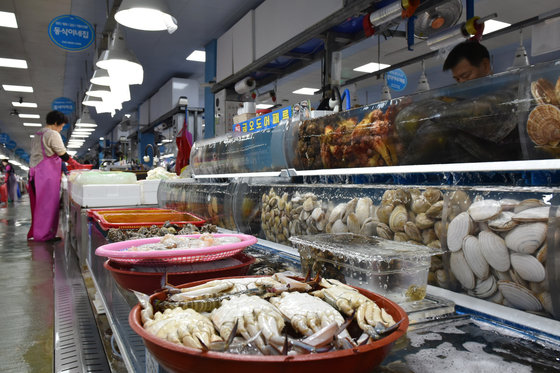 Merchants are busy welcoming customers at the Yeosu Fish Market in Jeollanam-do on the morning of the 26th, two days before the Chuseok holiday, the national holiday. September 26, 2023/News 1
Merchants are busy welcoming customers at the Yeosu Fish Market in Jeollanam-do on the morning of the 26th, two days before the Chuseok holiday, the national holiday. September 26, 2023/News 1 “The number of customers is decreasing, and I am worried about my livelihood. “I’m anxiously waiting for this Chuseok season.”
On the morning of the 26th, Yeosu Fishery Market in Jeollanam-do, two days before the Chuseok holiday, a national holiday.
Merchants were busy preparing ingredients or cleaning aquariums from early in the morning to serve fresh fish and seafood.
They are busy greeting guests, sweeping the floor with a broom or mopping with water.
Although the holiday season was in full swing, the merchants’ faces were not very bright.
There is concern that the Chuseok season, following the summer vacation season, will disappear due to the discharge of contaminated water from Fukushima, Japan.
As the price of fish has risen, customers who come here often turn away while bargaining, asking for a 5,000 won reduction.
Kim Nam-guk (53), who has been selling fish here for 20 years, said, “Last year, I received 30,000 won per kg for flatfish during Chuseok, but now it is around 35,000 won.” He added, “As the incoming unit price rises, we have no choice but to raise the price.” “He sighed.
He continued, “In the case of marine products, the first day of the holiday season is the biggest selling point,” and added, “I have expectations that ‘it is still the holiday time.’”
As the number of customers is decreasing, we have to worry about our livelihood, but there is no other way, so we are just anxiously waiting for Chuseok.
Another merchant said, “Consumer anxiety is growing due to the impact of contaminated water, and sales are taking a hit,” adding, “Sales are half of what they were last year. “I have to worry about my family’s livelihood,” he complained.
Yeosu City organized a joint inspection team with the National Fishery Products Quality Management Institute and carried out guidance and crackdown on the origin labeling of marine products targeting traditional markets and large supermarkets for two weeks before the holiday.
Inspecting marine products within the jurisdiction is conducted at least three times a week using four portable radiation measuring devices.
An official from Yeosu City said, “Currently, there is not a single business within the jurisdiction that exceeds the radiation-related standards,” and added, “If a complaint occurs regarding Japanese marine products, we are immediately dispatched to the site to conduct an inspection.”
Yeosu Fish Market opened in 1969 and has 109 stores, with its main products being fresh fish, live fish, and dried fish. Currently, it is about 70% marine products and 30% dried fish. In addition to marine products, dried fish are also not selling well, causing concern at every store.
(Yeosu = News 1)
Source: Donga
Mark Jones is a world traveler and journalist for News Rebeat. With a curious mind and a love of adventure, Mark brings a unique perspective to the latest global events and provides in-depth and thought-provoking coverage of the world at large.